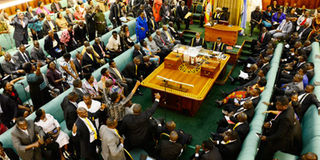Tax row: How MPs trapped themselves

Members of parliament.
What you need to know:
The ping pong. Parliamentary Commission blames “Animal Farm” politics as Finance ministry insists MPs must pay taxes
KAMPALA.
The taxman has made it clear: As longs as MPs pay is “consolidated”, Uganda Revenue Authority will demand Pay- As-You-Earn (PAYE) from them as there is a difference between “reimbursements” and the “taxable income”.
Realising that their term of office was about to end, the Parliamentary Commission sanctioned a new deal in 2014/15 Financial Year to increase gratuity for MPs, in a policy shift that largely sought among other things to assist the politicians live a comfortable life after Parliament.
“Their salary (taxable income) was small [about Shs2.6m] and their reimbursements [the allowances] did not attract PAYE because the two were separate,” URA’s public and corporate affairs officer, Ms Sarah Birungi Banage, said. “But when you consolidate the two, you end up with a flat figure and that raises the tax component. They did their thing but for us we are following the law.”
Explaining what could have prompted the consolidation of the members’ emoluments, Ms Banage said: “Once you raise your lump sum, you get a big gratuity but you cannot have your cake and eat it at the same time. But since they have passed the amendments to Income Tax law and they appealed, let us wait for what comes from the court.”
The consolidation of members pay was, however, done at a cost to the taxpayer. Daily Monitor investigations have revealed that for the gratuity of 386 MPs in the 9th Parliament every month, the government is now contributing more than Shs2.3b and about Shs27.7b annually.
Daily Monitor understands that because Parliament consolidated members emoluments, government’s monthly gratuity contribution to each MP’s pension increased from Shs780,000 to Shs6m. Each MP contributes 15 per cent of their pay. The members contribution also increased from about Shs390,000 to Shs3m, giving each MP a monthly saving of about Shs9m.
On taxing the consolidated salary and benefits, Finance ministry spokesperson Jim Mugunga, said they still “expect the national treasury to benefit from the contributions of the deductions from the MPs salaries…. the ministry expects URA to collect all arrears from MPs and related penalties.”
Speaking on behalf of the Parliamentary Commission, Mr Ronald Reagan Okumu (Aswa), the commissioner in charge of administration, blamed the tax row between URA and Parliament on what he called “Animal Farm politics” and accused civil society organisations (CSOs) of “dishonesty”, adding that instead of focusing on the cost of public administration in the country, “they are busy wasting time on small things”. “We did not consolidate members pay, we only consolidated releases because it was expensive to print vouchers for members. The question of mixing allowances and salary should not arise because the members’ pay is explained on the pay slips,” Mr Okumu said.
Mr Okumu added: “This is about Animal Farm story. There is a lot of power game. The executive wants to work with Parliament on other matters but when it comes to taxing members allowances, they want to portray Parliament as an institution that has failed the executive to deliver services to the people. The CSOs are just playing politics as if they pay taxes on their workshop facilitation allowances.”
Under the new arrangement, both salaries and allowances for the 386 MPs in the 9th Parliament were amalgamated and paid at once unlike the previous system where the remittances were done separately.
The new plan was reported to Ministry of Finance in August 2014, and later won support from the MPs after realising they would pocket a bigger gratuity, has now proven to be a double-edged sword as it subjects their allowances to be taxed by URA, a thing some have denounced as “unfair”.
However, when the issue of consolidating members’ pay came up, Mr Nicholas Opiyo, one of the analysts, said legislators all ought to pay the same percentage that all other Ugandans pay on their earnings. “To consolidate their pay for solely getting a higher gratuity is selfish and predatory,” Mr Opiyo said.
On Thursday, Mr Henry Musasizi (Rubanda East) moved an amendment to Income Tax law to exempt MPs allowances from PAYE. This was a response to the February 2 ruling of the Commercial Court, ordering the Parliamentary Commission chaired by Speaker Rebecca Kadaga to deduct tax from MPs’ emoluments. The Court had ordered that all taxes owing and due to the government be collected and remitted to URA starting 2004.
This judgment, however, infuriated MPs after they realised that each will cough up to Shs9m in PAYE. When the MPs approached the Commission, the authorities took a decision to appeal. On February 22, they filed the notice of appeal. However, before the appeal was heard last Thursday, Mr Musasizi moved the disputed amendment and reasoned that “the employment income of a person employed as an MP, except salary, is a facilitation.”
Analysis by Civil Society Budget Advocacy Group, a coalition of CSOs that seeks to influence government decisions on resource mobilisation, said if the Bill passed last Thursday is assented to by President Museveni, Ugandans will lose at least Shs41.58b in additional revenue needed to finance the budget shortfalls.
The numbers
Shs3m
MPs’ contribution to their pension, after increasing from about Shs390,000.
Shs6m
The government’s monthly gratuity contribution to each MP’s pension, up from Shs780,000.
Shs9m
Amount each MP is now assured of as saving each month



